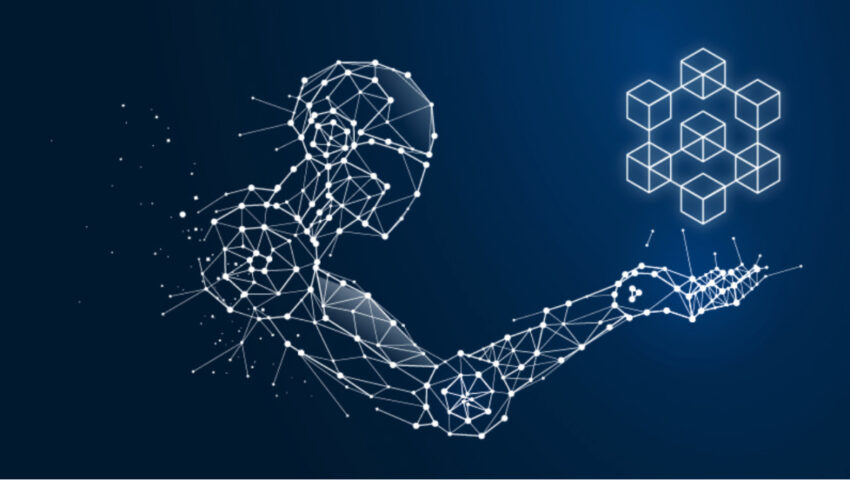Virtual assistants are gradually improving the conversational experience of their users. Chatting with artificial intelligence (AI) assistants is a lot easier today because of advancements like natural language processing (NLP). NLP is a core capability of chatbots that allows them to understand human language and respond accordingly.
In this blog, we will discuss how chatbots are revolutionizing language processing with the latest innovation in technology, blockchain. Welcome to an exciting era where chatbots can now send you personalized chat messages based on your preferences! But before getting into all the nitty-gritty, we’ll first give a high-level overview of how chatbots work and what their capabilities are today.
How does blockchain work?

Blockchain is a distributed database that maintains a continuously growing list of records called blocks. Each block contains a timestamp and a link to the previous block, similar to a chain. The data in each block cannot be altered without being recorded on the blockchain and can be verified by anyone using a computer with access to it.
As a result, transactions can be securely and accurately tracked, as opposed to relying on the processing power of any centralized organization or server. Transactions are made more secure because of this decentralized nature. It helps establish trust among parties involved in financial transactions, reduce human error, and improves overall efficiency. Blockchain technology can be used to track transportation goods activities and monitor fraudulent activities. Thus, it is revolutionizing chatGPT’s NLP capabilities
What are the benefits of blockchain?
The development of Blockchain has revolutionized the way data is stored and accessed. Blockchain is a type of database technology that employs a decentralized approach to storing and processing data. This approach leads to enhanced data security and trusts because it’s difficult for hackers to alter or delete data.
Through AI and blockchain, businesses can create new business models with increased efficiency and automation. It can be used for various processes such as artificial intelligence, machine learning, natural language processing (NLP), and others. Thanks to these technologies, businesses can now make their operations more efficient and cost-effective.
How does blockchain impact ChatGPT’s NLP capabilities?
ChatGPT uses machine intelligence to analyze and extract valuable information from customer chat, email, social media, and other text-based inputs. But the advent of blockchain technology has revolutionized ChatGPT’s NLP capabilities because it can add a layer of security and transparency to chatbot tasks. Blockchain-enabled chatbots can automate routine tasks such as scheduling meetings and managing emails. This has led to greater efficiency, customer satisfaction, and improved outcomes for businesses.
Blockchain technology also helps to ensure trust in the integrity of data and increases confidence in automated processes. This has significant business benefits in terms of cost savings, increased customer loyalty, and improved customer experience. Moreover, chatbots are becoming a key part of customer service organizations’ offerings. This has led to greater customer intelligence and better customer experience through chatbots that deliver relevant information and insights. With natural language processing (NLP), ChatGpt can efficiently automate repetitive and highly-customized tasks.
Why is blockchain important in ChatGPT’s NLP capabilities?
ChatGPT has leveraged the power of natural language processing (NLP) to understand and respond to requests in a similar way to a human. However, with the help of blockchain technology, chatbots are able to automate routine tasks such as scheduling meetings, managing emails, and making purchases. The technology provides businesses with enhanced decision-making capabilities by providing relevant information and insights. Moreover, chatbots can engage customers in a more natural way thereby increasing customer satisfaction.
By implementing chatbots into customer service platforms, businesses can save time and money while enhancing customer experience.
What are the challenges faced in implementing blockchain in ChatGPT’s NLP capabilities?
The use of natural language processing (NLP) in chat customer support chatbots is a promising solution for customer service organizations. However, NLP chatbot capabilities may struggle with emotional intelligence and context understanding. Additionally, chatbot learning algorithms may inherit biases from the training data they are given. These factors can lead to chatbot performances that are inconsistent with expectations. As such, organizations must ensure the security and transparency of automated processes when implementing blockchain in NLP capabilities. This includes a thorough consideration of cost-effectiveness and the potential impact on customer experience.
Conclusion
Blockchain has the potential to transform the chat industry by providing a secure platform for managing identities and digital assets. Because of this, several chat platforms are experimenting with blockchain-based solutions such as ChatGPT. By using blockchain to maintain chat histories and ensuring that chat information is accurate and secure, chat platforms can ensure customer satisfaction. If you’d like to learn more about blockchain and chat, comment below and we’ll get back to you!

